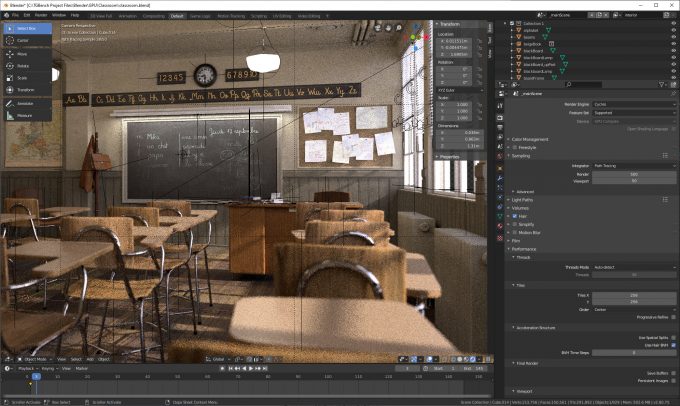- Qualcomm Launches Snapdragon 4 Gen 2 Mobile Platform
- AMD Launches Ryzen PRO 7000 Series Mobile & Desktop Platform
- Intel Launches Sleek Single-Slot Arc Pro A60 Workstation Graphics Card
- NVIDIA Announces Latest Ada Lovelace Additions: GeForce RTX 4060 Ti & RTX 4060
- Maxon Redshift With AMD Radeon GPU Rendering Support Now Available
Blender To Soon Launch ‘LTS’ Builds, Announces Plans For Version 3.0 In Summer 2021
The free and open-source Blender has been around for twenty-six years, but over the past handful, it’s begun to accelerate the amount of respect it receives, and the number of people who integrate it into their workflows. Unlike most commercial software, we’ve seen Blender continually innovate at a super-fast pace. It was even one of the first design tools on the market to deliver NVIDIA OptiX ray tracing acceleration with final-frame goals.
Going forward, Blender plans to both continue iterating on its feature set and capabilities, while also making some changes to make sure those who would like to remain glued to a specific version will be able to for some time. We’re going to soon enter the ‘LTS’ generation of Blender. Like what we see from Ubuntu, Blender LTSes will only see iterations released (eg: a, b, c) that tackle bug and security fixes, not core upgrades.
The idea here is that many studios are not going to feel safe adopting a design tool that sees regular upgrades, some of which may cause breakage. At the same time, the only way to make sure you’re up-to-date on the security front is to use the latest version. With LTS, that will change, as the version will be locked, with only crucial updates released from that point on.
With this move, Blender should only increase its adoption around the industry. Those end-users who don’t mind upgrading often will still have the ability to do so, and with the security of LTSes behind it, the development team may only accelerate its efforts with the “live” build.
Something to bear in mind is that if you use external plugins, you’ll also want to make sure that those vendors plan to properly support multiple Blender versions, which will probably be the case for the vast majority. The official blog post notes that an LTS is expected each year, and as mentioned above, each will last for two years.
The addition of LTS releases is major in itself, but Blender has also debuted the Blender 3 name. That could make it seem like that will become the first LTS, but in actuality, that will be Blender 2.83, which is due rather soon. 2.83 will transition to 2.90 in the summer, while 3.0 is being planned for release next summer.





